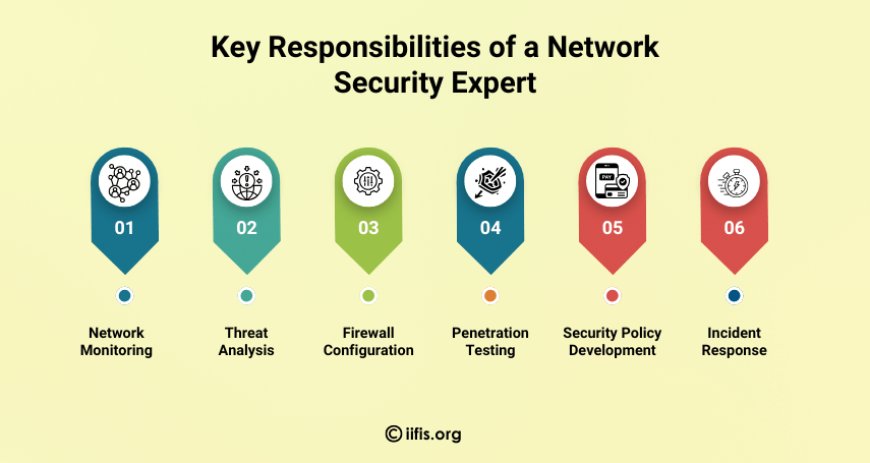Network Security Expert: Protecting Digital Infrastructure
A Network Security Expert safeguards your digital infrastructure by implementing strong security measures, monitoring threats, and ensuring data integrity in a dynamic environment.

Securing sensitive data and communication channels is essential. From my experience as a Network Security Expert, I know this requires not only strong security measures but also continuous monitoring, threat detection, and a swift response to emerging risks. Proactive defense strategies are vital to staying ahead of the ever-changing cyber threat environment.
Who is a Network Security Expert?
A Network Security Expert is a highly trained professional responsible for defending computer networks from unauthorized access, misuse, malfunction, or destruction. Their core responsibilities include monitoring network traffic, implementing security protocols, conducting vulnerability assessments, and responding to security breaches.
These professionals are often well-versed in technologies like firewalls, intrusion detection/prevention systems (IDS/IPS), VPNs, and antivirus software. They also understand complex concepts such as encryption, secure network design, and zero-trust architectures.
Importance of a Network Security Expert in Today’s Digital Age
As organizations continue to digitize operations and store critical data in the cloud, they expose themselves to potential cyberattacks. A Network Security specialist ensures that the organization’s networks are robust, secure, and capable of withstanding these threats.
From safeguarding intellectual property to protecting customer data, their work helps maintain organizational trust and business continuity. They are particularly essential in sectors such as healthcare, finance, education, and government, where data sensitivity is extremely high.
Key Responsibilities of a Network Security Expert
The role of a Network Security Expert is multifaceted. Some of their key duties include:
-
Network Monitoring: Continuously watching traffic to detect suspicious activity.
-
Threat Analysis: Identifying potential threats and devising strategies to mitigate them.
-
Firewall Configuration: Setting up firewalls and ensuring they operate effectively.
-
Penetration Testing: Simulating cyberattacks to test network resilience.
-
Security Policy Development: Crafting and updating security protocols and guidelines.
-
Incident Response: Managing and mitigating the impact of security breaches.
These experts not only protect against external threats but also help in detecting insider threats that can be equally damaging.

Essential Skills for a Network Security Expert
To succeed as a Network Security Expert, professionals need a strong blend of technical and analytical skills. Here are some of the essential competencies:
-
Deep Understanding of Networking Protocols: TCP/IP, DNS, HTTP/S, etc.
-
Knowledge of Security Tools: Wireshark, Snort, Metasploit, and others.
-
Analytical Thinking: Ability to assess complex systems and identify weak points.
-
Communication Skills: Explaining risks and solutions to non-technical stakeholders.
-
Certifications: Earning certifications such as Network Security certification credentials significantly boosts credibility.
Tools and Technologies Used by a Network Security Expert
A Network Security Expert relies on various tools and platforms to secure networks effectively. Commonly used tools include:
-
Firewalls and UTM Devices: To control incoming and outgoing traffic.
-
Intrusion Detection and Prevention Systems: For real-time monitoring and alerting.
-
Security Information and Event Management (SIEM): Aggregating data for threat detection.
-
Antivirus and Anti-malware: For endpoint protection.
-
Encryption Tools: To secure sensitive communications.
They also make use of scripting languages like Python or Bash to automate repetitive tasks and conduct in-depth security analysis.
How to Become a Network Security Expert
Becoming a Network Security Expert typically involves a combination of education, practical experience, and certification. Here’s a roadmap for aspiring professionals:
-
Educational Background: Start with a degree in computer science, information technology, or cybersecurity.
-
Gain Experience: Work in IT roles that involve networking, systems administration, or technical support.
-
Specialized Training: Enroll in cybersecurity courses that focus on network protection.
-
Certifications: Earn credentials such as those offered by IIFIS, CompTIA Security+, or Cisco CCNA Security.
-
Continuous Learning: Stay updated with evolving threats and new security technologies.
Building a strong foundation in networking is key, as is participating in hands-on labs and capture-the-flag (CTF) competitions to refine skills.
Future Outlook for Network Security Experts
With cyber threats becoming more sophisticated, the role of the Network Security Expert will continue to expand. Companies are now investing heavily in cyber defense, and network security is often the first line of protection.
Network Security Experts are crucial in safeguarding digital infrastructures from attacks, ensuring data integrity and system reliability. Whether securing assets or pursuing a cybersecurity career, understanding their role is key to a safer digital future.
With growing cyber challenges, the need for skilled and certified professionals continues to rise. Investing in professional training and certifications, like those offered by IIFIS, can be a game-changer for anyone aspiring to excel in this field.























